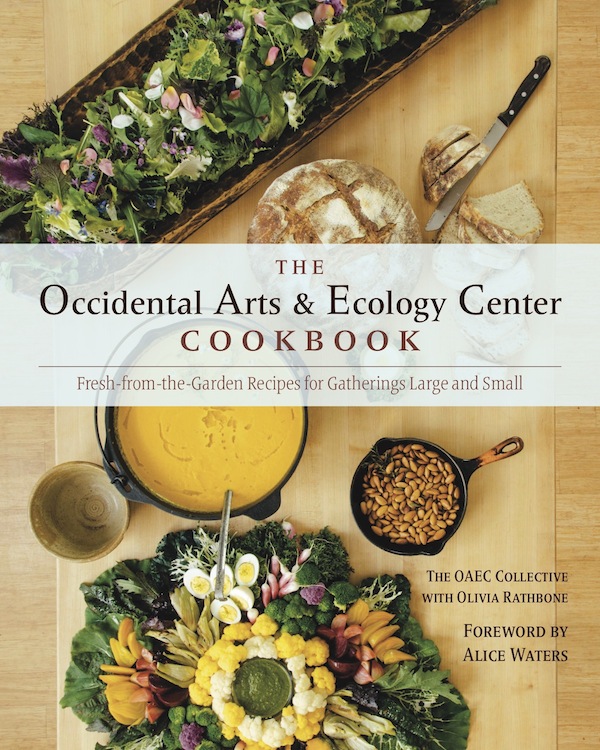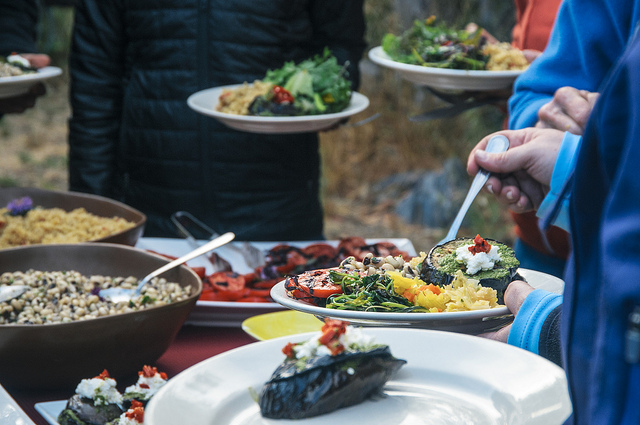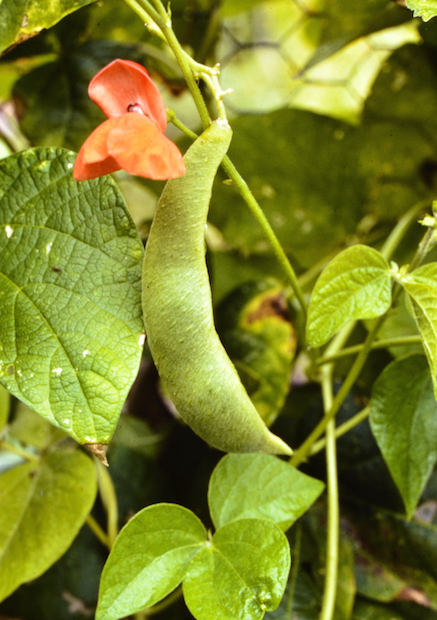NOTE: The OAEC cookbook is temporarily sold out. To order, please check back later.
The Occidental Arts & Ecology Center Cookbook: Fresh-from-the-Garden Recipes for Gatherings Large and Small, by the OAEC Staff Collective and former Kitchen Manager Olivia Rathbone, is a collection of inventive recipes from OAEC.
- A Foreword by Alice Waters
- Over 200 recipes based on the Mother Garden’s collection of rare, open-pollinated food crop varieties from around the world as well as “weeds” and foraged ingredients from the OAEC wildlands ecological preserve.
- Lush photographs, rich with the beauty and magic of the OAEC experience.
- Measurements for family style (4 to 6) and for crowds (30 to 40); a unique resource for potlucks, family gatherings, and community celebrations.
Press:
- Get the complete digital press kit from Chelsea Green Publishing.
- Read the interview with Olivia in Civil Eats.
- Civil Eats named the OAEC Cookbook one of the best food and farm books of 2015
- The OAEC Cookbook Wins IACP award! Read the Press Democrat article.

Inspiration for the Cookbook
One of the first farms to be certified organic in California, OAEC has been a vocal advocate for the preservation of biodiversity and ecological agriculture since the early 1970’s. Through a living seed collection of over 3,000 heirloom vegetable, fruit and herb varieties well adapted to the local climate, the OAEC “Mother Garden” continues to feed and inspire activists, biologists, educators and artists seeking innovative and practical approaches to the pressing environmental, cultural and economic crises of our day while celebrating and eating well!
Please consider purchasing the Cookbook through OAEC as a fundraiser for our nonprofit, or help to increase demand for the book by requesting it from your local bookseller.

“The gardens and kitchen of the Occidental Arts & Ecology Center are magical places which have been nourishing and inspiring visitors there (myself included) for decades. This compilation of recipes from their kitchen opens this magic to a broader audience of people looking to cultivate values like sustainability, seasonality, and wholesome goodness into their kitchens. This broad-ranging and skill-building book has lots of great ideas for using acorns, garden weeds, less common vegetables and fruits, and parts of garden plants at different stages of development, rather than just the usual vegetables.”
—Sandor Ellix Katz, author of The Art of Fermentation
“Throughout human history, food has been intimately tied to community. At the Occidental Arts and Ecology Center, this vital connection is renewed. Reading this book and cooking these recipes will transport you to a magical place, where deep and important work is being done, beautiful and delicious food is being cooked, and the earth is being healed in a thousand ways each and every day.”
—Jessica Prentice, author of Full Moon Feast and Co-Founder of Three Stone Hearth Community Supported Kitchen
“Cookbooks inspire us in creative ways for feeding family and friends, but this one goes further. The recipes are uninhibited, rich, and earthy, derived from a deep communal relationship with soil and sun and air and water. Some of them even show us how to live with each other more considerately on this earth. We all talk about community and sustainability, but talk is cheap. The folks at OAEC are walking it, they’ve dedicated their lives to it, and now with this book they are sharing their experience in all of its complex, imperfect, delicious, and nutritious ways.”
—Michael Ableman, author of Fields of Plenty
“I am wildly excited about The Occidental Arts & Ecology Center Cookbook! This handsome book shows how you can eat and live when you take gardening and community seriously. It’s not about a restaurant, but about living and working with others, about being surrounded with gardens and the beautiful, nourishing meals made from the plants that grow in them. I found this to be a deeply inspiring and wise chronicle.”
—Deborah Madison, author of Vegetable Literacy and The New Vegetarian Cooking for Everyone
“The OAEC has been at the forefront of seed saving, heritage food crop preservation, and stewardship since long before those terms developed the sort of cachet they have today—and you can see the ethos of the place in every dish in this book. These dishes represent the sort of hearty, nourishing, unpretentious fare that brings family and friends together at the table; I love that the recipes are scaled so that you can feed 4 people—or 30, should you so choose! But more than just being a collection of delicious recipes, these pages capture a way of life for a whole community, whose values of ecological research, sustainable farming, and environmental advocacy are so vitally important.”
–Alice Waters, Founder and Executive Chef of Chez Panisse, from the OAEC Cookbook foreword
Summer Sample Recipe
Fresh Shelled White Runner Beans simmered in tomato, red chili and preserved lemon
Runner beans are an easy to grow, climbing perennial bean that will come back year after year in mild climates with edible, hummingbird attracting flowers and a bumper crop of beans that can be eaten in all stages of their development. From edible flowers and young tender snap beans in July, to fresh shelling beans in August, and finally as summer turns to fall, the dry pods yield fat, meaty dry beans for storage through the winter months. For the die-hard self-sufficient homesteader, this low-maintenance protein source is perfect post-peak-oil-collapse food.
We’ve fallen in love with a huge white runner bean variety called “Gigante” or “White Dutch Runner” from seed shared by a fellow seed saving aficionado at the Ecological Farming Association seed swap. We prefer it for cooking fresh since it doesn’t turn grey like the purple variety and is so big and meaty, it mysteriously tastes like it’s been stewed with a ham hock!
Harvest fresh shelling beans when pods become fully plump but not yet dry.
Serves 4 to 6
2 c fresh white runner beans, shelled from the pod
or substitute other fresh shelling bean such as coco bianco or cranberry bean
6 medium tomatoes, quartered
1 clove garlic
2 t minced fresh red hot chiles, such as thai dragon or aji cristal
2 T preserved lemon, minced
2 T chopped fresh parsley
Serves 30 to 40
12 c fresh white runner beans, shelled from the pod
or substitute other fresh shelling bean such as coco bianco or cranberry beans
36 medium tomatoes, quartered
6 clove garlic
2-3 small red hot chiles, minced, such as thai dragon or aji cristal
½ c preserved lemon, minced
½ c fresh parsley, chopped

A new world native plant, perennial Runner Beans were originally cultivated in Central America and are known in Nahautl as “ayoctl” or in Spanish “ayocote.” The runner beans at OAEC have been in the ground for over 10 years and have literally produced hundreds of pounds of beans for the kitchen and for giving away at regional seed exchanges.
Shuck fresh beans from the pod. Bring a pot of water to a boil and add the beans. Boil until beans cook all the way through and are no longer starchy, about 20 minutes, then drain in a colander.
Meanwhile, in a shallow saucepan, put in a dash of olive oil and quartered fresh tomatoes. Simmer covered on medium heat until tomatoes fall apart, about 15 minutes. With a mesh ladle (aka spider,) comb through the sauce and strain out the majority of the skins.
Put a dash of oil in a skillet on medium heat and add the garlic and red pepper. Then add the cooked, drained beans. Sautee for 2 minutes until the garlic cooks just a little.
Stir the bean mixture and preserved lemon into the tomato sauce. Stew covered on a low simmer for 15 minutes or so (a little longer for the large batch) until the beans absorb some of the liquid. Top with fresh parsley. Serve with your favorite pasta or atop Polenta Fresh Corn Custard (page 224.)





